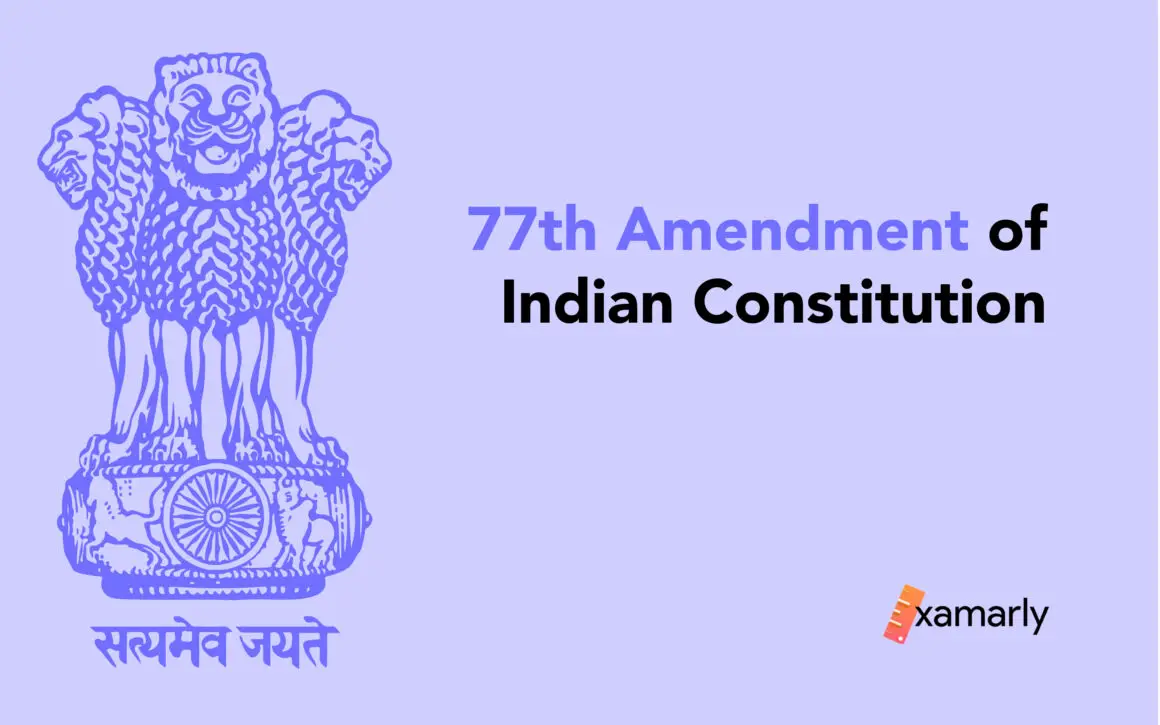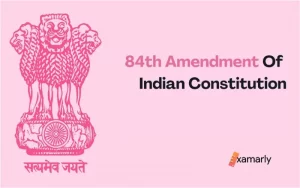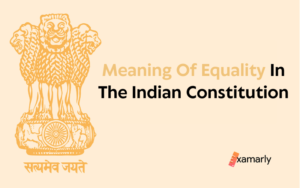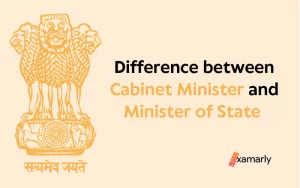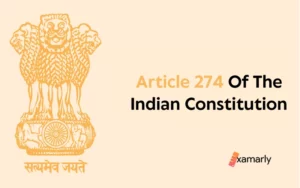The Constitution (Seventy-Seventh Amendment) Act, 1995 is the formal name of the 77th Amendment of the Indian Constitution. On May 31st, 1995, the 77th amendment was proposed in the Lok Sabha.
The said Act broadened the reservation provisions for job promotions, encompassing individuals belonging to Scheduled Castes and Tribes.
Read this article to get in-depth knowledge about the 77th amendment of the Indian Constitution. This is a part of the Indian Polity of UPSC Syllabus. This article will help you in your UPSC Exam preparation.
- Background
- 77th Amendment of the Indian Constitution
- Objects and Reasons
- Constitutional Provisions
- Conclusion
- FAQs on 77th Amendment of the Indian Constitution
- What is the 77th Amendment of the Indian Constitution?
- Which article of the Indian Constitution did the 77th Amendment amend?
- What article 16 of the Constitution of India deals with?
- What does clause 4A of Article 16 deal with?
- What was the need for the 77th Amendment?
- What is necessary for granting reservation in promotions as per Supreme Court?
- State the conditions under which reservation in promotion is granted.
Background
- After India gained its independence in 1950, one of the earliest examples of affirmative action initiatives in the world was the implementation of a policy of reservation for underprivileged groups.
- Prior to achieving independence, both the British and certain princely states within India attempted to address issues of representation and education in order to establish a greater sense of equality.
- In 1954, the Indian Ministry of Education sent a letter to the states stating that 20% of seats in educational institutions should be reserved for students belonging to Scheduled Castes (SCs) and Scheduled Tribes (STs). The minimum required marks for enrollment to these institutes might also be relaxed by 5%, according to the proposal.
- These measures and incentives are in accordance with the Constitution of India. Article 46 of the Directive Principles of State Policy stipulates that the State must prioritize the educational and economic well-being of weaker sections of the society, specifically Scheduled Castes and Scheduled Tribes, and protect them from social injustice and exploitation.
- Moreover, Article 15(4) explicitly permits the State to make special provisions for the advancement of socially and educationally backward classes of citizens, including Scheduled Castes and Scheduled Tribes. This provision overrides any restrictions outlined in Article 15 or clause (2) of Article 29.
- In 1982, the University Grants Commission (UGC) issued a directive to its affiliated colleges and universities, increasing the percentage of reservation quota for Scheduled Castes (SCs) and Scheduled Tribes (STs) from 5% to 7.5%.
- The Supreme Court of India ruled that reservation quotas should be kept at 50% or less in 1992.
- However, several states have greater than 50% quotas, and litigation before the Supreme Court is ongoing. As an example, it can be noted that Tamil Nadu has implemented a reservation policy based on caste, which amounts to 69%.
- In 1992, the Supreme Court of India ruled in the Indra Sawhney case that providing reservations in the promotion of jobs was unconstitutional. However, the court allowed for the practice to continue for up to five years.
- In 1995, prior to the expiration of the five-year window, the government introduced the 77th Amendment to the Indian Constitution, thereby extending reservations in government job promotions.
- In the Indra Sawhney case, the Supreme Court ruled that Article 16(4) of the Indian Constitution, which grants the government the authority to enforce reservations for disadvantaged communities in appointments or posts, applies exclusively to initial appointments and does not extend to promotion in service.
- The Act went into effect on June 17, 1995, after the bill was approved. P.V. Narasimha Rao served as India’s Prime Minister during that period of time.
Also read: Advisory Jurisdiction of Supreme Court
77th Amendment of the Indian Constitution
On 17 June 1995, the 77th amendment of the Indian Constitution came into effect. This amendment was enacted in the Forty-sixth year of the Republic of India. This modifies article 16 of the Indian constitution.
On May 31st, 1995, the 77th amendment was proposed in the Lok Sabha. This Act increased the reservations for Scheduled Castes and Tribes for promotion in employment. The Supreme Court’s verdict on reservations in promotions was overturned by this amendment.
Main Points:
- With this change, the Constitution’s Article 16 now contains a new clause (4-a).
- This gives the State the authority to make any reservations in favor of SCs and STs in promotions to government employment if it believes that their representation in state services is insufficient.
- According to the purpose of the 77th Amendment, the degree of representation of SCs and STs in the states had not reached the level that was wanted, and it was declared that this structure had to be maintained in order to provide these groups with enough representation.
- This was done in order to overturn the Supreme Court’s ruling that quotas on promotions are unlawful in the case of the Mandal Commission (Indra Sawhney v. Union of India).
To learn more about the case of Indra Sawhney v. Union of India, click here.
Objects and Reasons
The Constitution (Eighty-sixth Amendment) Bill of 1995, which was later passed as The Constitution (Seventy-seventh Amendment) Act of 1995, included a statement of purposes and justifications.
Since 1955, the Scheduled Castes (SC) and Scheduled Tribes (ST) have had access to the facility of reservation in the promotion.
However, the Supreme Court stated in its decision dated November 16, 1992, in the issue of Indra Sawhney and Others vs. Union of India and Others that reservation of appointments or posts under Article 16(4) of the Constitution is restricted to initial appointment.
Further, it cannot extend to a reservation in matters of promotion. The interests of the SC and STs will be harmed by this Supreme Court decision.
It is vital to continue the current dispensation of offering reservations in promotion for the Scheduled Castes and the Scheduled Tribes since their representation in services in the States has not achieved the requisite level.
The government has chosen to maintain the prevailing policy of reservations in the promotion of the Scheduled Castes and the Scheduled Tribes in light of its commitment to safeguarding the interests of these groups.
To achieve this, it is necessary to change Article 16 of the Indian Constitution. This is accomplished by adding a new clause (4A) to the aforementioned article that establishes a reservation in promotion for the Scheduled Castes (SCs) and Scheduled Tribes (STs).
The Bill accomplish to accomplish the forenamed object.
Constitutional Provisions
77th amendment of the Indian Constitution amended article 16. After clause (4), the clause mentioned below shall be added to Article 16 of the Constitution:
There is nothing in this article that hinders the State from knitting any provision for reservation in terms of promotion to any class or classes of posts in the services under the State for the benefit of the Scheduled Castes and the Scheduled Tribes. The State may do so if it believes that these groups are not adequately represented.
Conclusion
The 77th amendment went into effect on 17 June 1995. This constitutional amendment modifies article 16 of the constitution of India.
77th amendment of the Indian Constitution guaranteed Scheduled Castes and Scheduled Tribes reservations for promotion in government offices. The Supreme Court’s decision regarding reservations in promotions was invalidated by this amendment.
In the interest of further readings:
FAQs on 77th Amendment of the Indian Constitution
What is the 77th Amendment of the Indian Constitution?
The 77th Amendment is a modification made to the Indian Constitution in 1995 that introduced clause 4A to Article 16, addressing the issue of reservation in promotions for Scheduled Castes and Scheduled Tribes.
Which article of the Indian Constitution did the 77th Amendment amend?
The 77th Amendment brought a modification to Article 16 of the Indian Constitution. The said amendment added Clause 4A to the said article.
What article 16 of the Constitution of India deals with?
In matters of public employment, the Indian Constitution’s Article 16 focuses on ensuring equality of opportunity.
What does clause 4A of Article 16 deal with?
Clause 4A of Article 16 pertains to the provision of reservation in promotions for the Scheduled Castes and the Scheduled Tribes. It enables the government to make provisions for the reservation of appointments or posts in favor of these groups in matters of promotion.
What was the need for the 77th Amendment?
The 77th Amendment’s stated goal was to ensure that Scheduled Castes and Scheduled Tribes had adequate representation in the states.
What is necessary for granting reservation in promotions as per Supreme Court?
The SC of India ruled in January 2022 that the collection of data to assess the inadequacy of representation of SCs or STs in government positions is a prerequisite for granting reservations in job promotions.
State the conditions under which reservation in promotion is granted.
The M. Nagraj Judgement established three conditions that must be met by the State before granting a reservation in job promotion for a member of a Scheduled Caste or Scheduled Tribe:
a. The State must demonstrate the backwardness of the group.
b. The State must demonstrate that the group is underrepresented in the position or service for which reservations in a promotion will be granted.
c. The State must demonstrate that the reservations will not compromise the overall efficiency of administration.


